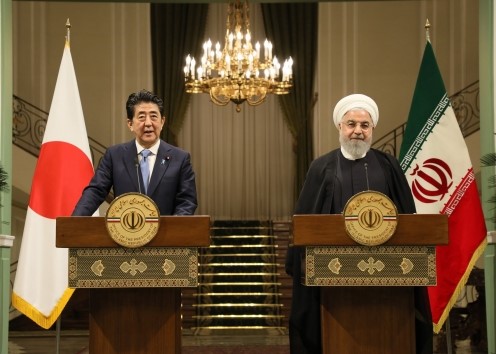 Photo Courtesy: Prime Minister's Office of Japan on Facebook
Photo Courtesy: Prime Minister's Office of Japan on Facebook
JCPOA – Japan to the rescue
Last week, Japan’s Prime Minister Shinzo Abe met with Iran’s Supreme Leader Ayatollah Ali Khamenei and Iranian President Hassan Rouhani.
With his visit, Abe intended to “play the maximum role […] for easing tension,” which has been growing since the US exited the Iran nuclear deal in May 2018. Apparently, it was President Trump himself who encouraged Abe to take on the role of mediator.
The leaders’ meeting concluded with Khamenei stating that “Iran has no intention of making or using nuclear weapons.”
What were the reasons behind the meeting?
Easing the tensions between the US and Iran wasn’t Abe’s only goal during his Iran visit.
Japan depends heavily on Iran for its energy needs. Tokyo has always been a major importer of Iranian oil. Before 2012, 10 to 15 percent of Japan’s oil came from Iran.
However, after Trump’s order to revoke waivers that allowed some countries (including Japan) to continue trading with Iran, Tokyo reluctantly had to stop its imports.
Abe confirmed Japan continues to be “interested in […] buying Iran’s oil.” Because of Iran’s eagerness to re-start its economic trades, Khamenei and Rouhani were more than happy to welcome Abe to their country.
Moreover, Abe’s visit constituted an opportunity for Iran to show the rest of the world that, despite its precarious relationship with the US, leaders of wealthy and powerful countries still have an interest in maintaining diplomatic and business relationships with Iran.
An additional reason for Abe’s visit was his desire to raise his diplomatic profile. This year, the G20 summit will take place in Osaka, at the end of June; Japan will also hold its Upper House election later this summer.
Lastly, Japan has always been an advocate of the JCPOA. Because Japan itself is not signatory of the deal, its support for the JCPOA is viewed as factual and unbiased.
Need for mitigation
According to Middle East experts, the risk of an accidentally-triggered conflict between the US and Iran is rising. Last May, the US decided to send 900 additional troops to the Middle East and extend the deployment of 600 troops already in theater. It also sent 4 B-52 bombers, several Patriot missile batteries, and the USS Abraham Lincoln Carrier Strike Group to the area.
National Security Advisor John Bolton claimed that was the consequence of a series of distressing indications by Iranian authorities, including the deployment of cruise missiles on a number of Islamic Revolutionary Guard Corps’ boats. It didn’t help that, just a few hours before Abe’s arrival in Iran, rebels from Yemen’s Iranian-supported Houthi movement carried out a missile attack on a Saudi Arabian civilian airport, causing 26 deaths.
After his meeting with Rouhani, Abe insisted on the importance of avoiding any possible “accidental conflict” between the US and Iran.
Need for open communication
The rhetoric between the US and Iran continues to be dangerously bitter.
After his meeting with Abe, Khamenei stated he wasn’t interested in holding any sort of talk with Trump, as he is “not a party worth exchanging a message with.” Earlier that week, Iranian Foreign Minister Mohammad Javad Zarif said that “[w]hoever starts a war with us will not be the one who finishes it.” On his part, Trump had warned that “[i]f Iran wants to fight, that will be the official end of Iran.”
The US and Iran need to re-establish a direct line of communication, and Japan’s mediation might be a way to achieve that. Neither country can afford to misunderstand the other, or be misunderstood. Should one party misinterpret the other’s deterrence strategy as an aggressive act, the tensions between the two might escalate to a disastrous military confrontation.
What’s next?
After the meeting, Khamenei confirmed his country would remain committed to the JCPOA, claiming nuclear weapons are “against Islam.” Just a few days later, though, Iran announced it is going to break the low-enriched uranium limit set by the deal.
Despite Japan’s intention to bring peace and stability to the region, some worry Tokyo might not have enough leverage with either parties, and that its attempted mediation might, in the long run, prove unsuccessful. Moreover, it’s worth remembering Japan has its own Middle East interests to safeguard.
The best and most realistic development would see Abe convincing the US and Iran to resume direct talks. Perhaps, Iran’s recent release of US permanent resident Nizar Zakka, who was arrested for spying in 2015, might be a first step towards a new dialogue.





